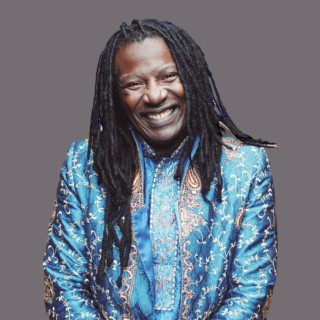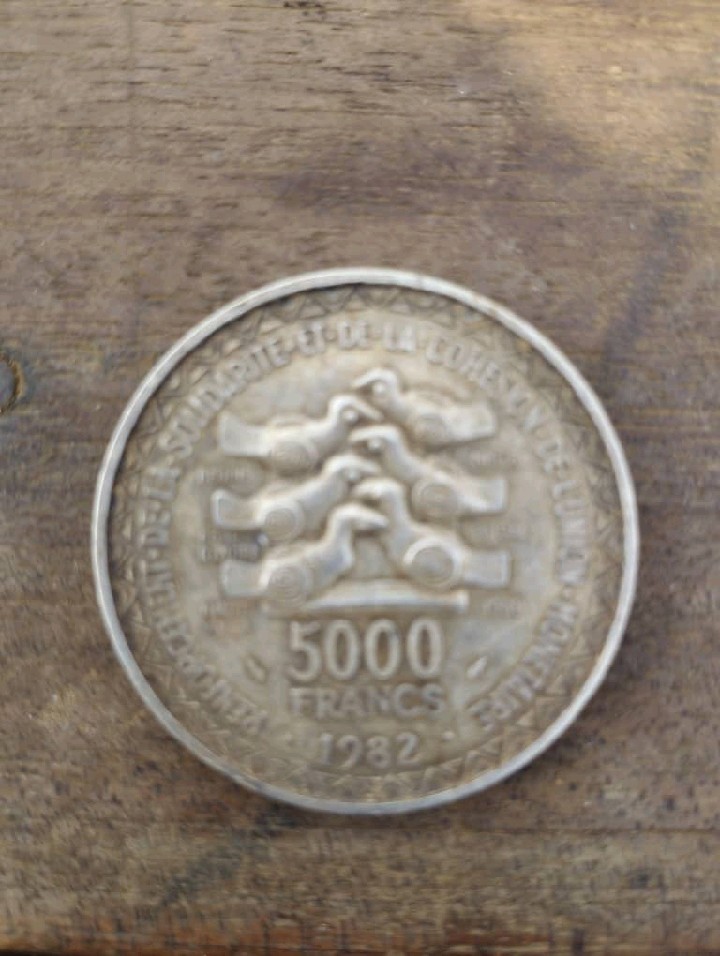
Alpha Blondy
The first son of a family of eight children, Seydou Koné was raised by his grandmother in an environment described by him as "among elders", which was to have a big impact on his career.
In 1962, Alpha Blondy joined his father in Odienné, where he spent ten years, attended Sainte Elisabeth High School, and was involved in the Ivory Coast students movement. He formed a band in high school, but this affected his schooling and he was expelled for poor attendance. His parents sent him to study English in Monrovia, the capital city of Liberia, in 1973. He spent thirteen months there and then moved to the United States to improve his English.
Many Alpha Blondy songs become very popular and trendy online with a great number of streaming and downloads on Boomplay.
Career
In 1974, Seydou moved to New York where he majored in English at Hunter College and the Columbia University American Language Program because he wanted to be a teacher. In New York, he met Rastafari for the first time and saw concerts by Jamaican artists such as Burning Spear. Seydou was involved in multiple altercations and returned to the Ivory Coast, where he got into more trouble until he met one of his childhood friends, Fulgence Kassi, who had become a noted television producer. This was the beginning of his real career as a musician, and he began to use the name "Alpha Blondy".
After various TV shows for Kassi, Blondy recorded his first solo album in 1982, entitled Jah Glory. This album was to have enormous success and would become later a symbol of resistance because of the song "Brigadier Sabari," which documents his experience of being arrested in Abidjan in the 1980s and his subsequent mistreatment by the police.
Alpha Blondy became a big star in Abidjan with his African twist of Reggae music, becoming in the eyes of his fans "the Bob Marley of Africa". Alpha Blondy is spiritual, political and positive just like Marley himself, and recorded a cover of Bob Marley's song "War". In order to reach more people with his message, he chose to sing in many languages: English; French; Baoulé, and his native language - Dioula. Later, he also brought new instrumentation to his brand of reggae such as the violin and cello.
Soon, the fame of Alpha Blondy spread to Europe. Following the success of an EP entitled Rasta Poué, he went to Paris in 1984 to make his second album, Cocody Rock, with the label Pathe Marconi. The "Bob Marley of Africa" travelled to the island of Jamaica and recorded the title track of this album with Marley's backing group, The Wailers.
Back home in 1985, Blondy went into the studio to record "Apartheid is Nazism", a call for the end of apartheid. In 1986, he recorded “Jerusalem” at Tuff Gong studios in Jamaica, again with The Wailers featuring legendary Aston "Family Man" Barrett. Blondy tried to promote unity between the religion of Islam, Judaism and Christianity. He drew his arguments and inspiration from his own diverse knowledge of the Bible, the Quran, and the Torah.
That same year, he sang in Hebrew during a concert in Morocco. At this point, he was continuously touring. His new album Revolution had a lighter, gentler sound; this album featured cellos in the instrumentation, and the line-up included veteran Ivory Coast singer Aicha Kone. The album also included "Jah Houphouët parle", a long speech by Ivory Coast president Félix Houphouët-Boigny with only the most minimal beat behind it.
Blondy spent the years 1987-89 giving concerts and recording SOS Guerre Tribale in Abidjan. This was promoted by Blondy himself, as he was distancing himself from Pathe Marconi at this stage.
This was not to be a real success but it did not deter Blondy and in 1991 he returned to Europe for a concert tour and to record his famous album Masada with the help of musical legends such as Bocana Maiga and UK reggae producer Dennis Bovell. The album, with its hit single "Rendez Vous", was a huge success, and Blondy was later to receive his first Gold Disc in Paris.
At the beginning of 1993, worn out from a world tour, Blondy succumbed to depression and was taken into an institution for psychiatric help. But as his health recovered he recorded the album Dieu ("God"), on which he appears more spiritual and religious, on tracks such as "Heal Me", about his illness and recovery.
Blondy's psychiatric treatment continued but on 10 December 1994, he was back with the festival in memory of President Houphouet, and later he made his European comeback at a storming concert at Le Zenith in Paris. In 1996, Blondy released a hits compilation and went back into the studio to record the alb...more
Songs(1)
Albums(0)
Playlists(2)
-
1
Listen to Alpha Blondy’s new songs including "Gban-Gban", and many more. Enjoy Alpha Blondy’s latest songs and explore the Alpha Blondy’s new music albums. If you want to download Alpha Blondy songs MP3, use the Boomplay App to download the Alpha Blondy songs for free. Discover Alpha Blondy’s latest songs, popular songs, trending songs all on Boomplay.
Alpha Blondy Biography
The first son of a family of eight children, Seydou Koné was raised by his grandmother in an environment described by him as "among elders", which was to have a big impact on his career.
In 1962, Alpha Blondy joined his father in Odienné, where he spent ten years, attended Sainte Elisabeth High School, and was involved in the Ivory Coast students movement. He formed a band in high school, but this affected his schooling and he was expelled for poor attendance. His parents sent him to study English in Monrovia, the capital city of Liberia, in 1973. He spent thirteen months there and then moved to the United States to improve his English.
Many Alpha Blondy songs become very popular and trendy online with a great number of streaming and downloads on Boomplay.
Career
In 1974, Seydou moved to New York where he majored in English at Hunter College and the Columbia University American Language Program because he wanted to be a teacher. In New York, he met Rastafari for the first time and saw concerts by Jamaican artists such as Burning Spear. Seydou was involved in multiple altercations and returned to the Ivory Coast, where he got into more trouble until he met one of his childhood friends, Fulgence Kassi, who had become a noted television producer. This was the beginning of his real career as a musician, and he began to use the name "Alpha Blondy".
After various TV shows for Kassi, Blondy recorded his first solo album in 1982, entitled Jah Glory. This album was to have enormous success and would become later a symbol of resistance because of the song "Brigadier Sabari," which documents his experience of being arrested in Abidjan in the 1980s and his subsequent mistreatment by the police.
Alpha Blondy became a big star in Abidjan with his African twist of Reggae music, becoming in the eyes of his fans "the Bob Marley of Africa". Alpha Blondy is spiritual, political and positive just like Marley himself, and recorded a cover of Bob Marley's song "War". In order to reach more people with his message, he chose to sing in many languages: English; French; Baoulé, and his native language - Dioula. Later, he also brought new instrumentation to his brand of reggae such as the violin and cello.
Soon, the fame of Alpha Blondy spread to Europe. Following the success of an EP entitled Rasta Poué, he went to Paris in 1984 to make his second album, Cocody Rock, with the label Pathe Marconi. The "Bob Marley of Africa" travelled to the island of Jamaica and recorded the title track of this album with Marley's backing group, The Wailers.
Back home in 1985, Blondy went into the studio to record "Apartheid is Nazism", a call for the end of apartheid. In 1986, he recorded “Jerusalem” at Tuff Gong studios in Jamaica, again with The Wailers featuring legendary Aston "Family Man" Barrett. Blondy tried to promote unity between the religion of Islam, Judaism and Christianity. He drew his arguments and inspiration from his own diverse knowledge of the Bible, the Quran, and the Torah.
That same year, he sang in Hebrew during a concert in Morocco. At this point, he was continuously touring. His new album Revolution had a lighter, gentler sound; this album featured cellos in the instrumentation, and the line-up included veteran Ivory Coast singer Aicha Kone. The album also included "Jah Houphouët parle", a long speech by Ivory Coast president Félix Houphouët-Boigny with only the most minimal beat behind it.
Blondy spent the years 1987-89 giving concerts and recording SOS Guerre Tribale in Abidjan. This was promoted by Blondy himself, as he was distancing himself from Pathe Marconi at this stage.
This was not to be a real success but it did not deter Blondy and in 1991 he returned to Europe for a concert tour and to record his famous album Masada with the help of musical legends such as Bocana Maiga and UK reggae producer Dennis Bovell. The album, with its hit single "Rendez Vous", was a huge success, and Blondy was later to receive his first Gold Disc in Paris.
At the beginning of 1993, worn out from a world tour, Blondy succumbed to depression and was taken into an institution for psychiatric help. But as his health recovered he recorded the album Dieu ("God"), on which he appears more spiritual and religious, on tracks such as "Heal Me", about his illness and recovery.
Blondy's psychiatric treatment continued but on 10 December 1994, he was back with the festival in memory of President Houphouet, and later he made his European comeback at a storming concert at Le Zenith in Paris. In 1996, Blondy released a hits compilation and went back into the studio to record the alb
Comments (78)
New Comments(78)
shank recipe
that's my Men
mailto:[email protected]
Merci
diasdanielBrink
bant jou vas
Yves f fassinou
that's my Men
Fofana moussaces5q
c'est jazz
164133753
Alpha blondy
ALASSANE OUATTARAgj9fd
Bonsoir
Abou Diengdhw7o
Col rastta
132344147
l love it and is music is good
Samuel Ahiator
great
154459075
cool
FAQs about Alpha Blondy
Where is Alpha Blondy from?
He is from Côte d'Ivoire.
How to download songs of Alpha Blondy?
You can download songs of Alpha Blondy from Boomplay App for free.
Firstly, install Boomplay app on your mobile phone.
Secondly, navigate to the song you would like to download.
Thirdly, Tap on More > Download.

,,vux